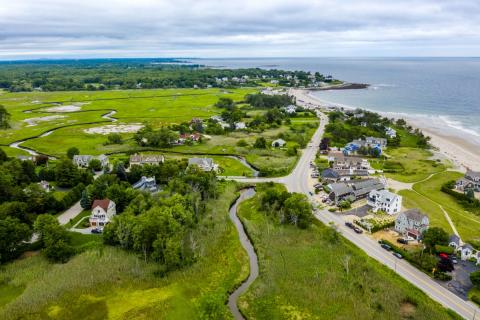NH and Maine navigating resilience together

Making decisions to plan for and adapt to current and anticipated effects of climate change in coastal communities requires pushing through challenges and over boundaries.
This November, over 60 members of the New Hampshire Coastal Adaptation Workgroup (CAW) and Maine Climate Change Adaptation Providers (CCAP) Network collaborated across state boundaries and coastlines to come together for their eighth annual bistate climate networks meeting.
Traditionally an opportunity for in-person connection and networking, the 2020 Climate Networks Meeting was held virtually due to the COVID-19 crisis. At the meeting, university faculty and staff, state agency reps, regional planners, municipal leaders and staff, non-governmental representatives, and environmental consultants joined together to learn and share information and perspectives.
“Though Maine and New Hampshire have very different coastlines, we share some common challenges in climate adaptation work,” said Lisa Wise, one of the meeting organizers and a member of CAW representing both New Hampshire Sea Grant and UNH Extension. “So, it is really valuable and energizing to come together for this annual learning opportunity.”
Two featured speakers led talks exploring their respective expertise, driving dynamic discussions connecting the topics to local issues and personal experiences.
Dr. Linda Shi of Cornell University’s Department of City and Regional Planning guided the participants through an exploration of her research on the structural limits to adaptation and how to overcome them, focusing on legal and fiscal hurdles preventing municipalities from taking action and the quickly changing landscape of where the momentum for climate adaptation efforts originates.
Dr. Shi highlighted how municipalities are at the center of many climate adaptation conversations and actions, and that they are pulled in many opposing directions by various stakeholder groups, making decisive responses difficult. The equation is further complicated by the sources of local revenue through taxes, which stand to change as property values are reshaped by climate threats. Changing property values also pose risks for disadvantaged populations and lower income areas that are relatively safer from climate threats, but where residents may be pushed out by wealthier buyers retreating to “safer” locales or left unsupported as tax revenue dries up.
Participants described Dr. Shi’s presentation as “remarkable” and “eye-opening,” “the best I’ve seen in describing the interconnection between land use and climate mitigation/adaptation.”
The second speaker, Dr. Bridie McGreavy, an associate professor in the Department of Communication and Journalism at the University of Maine, shared techniques for improving equity and inclusivity in the planning process for climate actions.
Her session featured stories of success in climate planning in Maine and New Hampshire, highlighting the key questions asked by planners that successfully included local stakeholders, their ideas, and their priorities. She identified strategies for achieving this including a framework for maximizing access for stakeholders to the planning process, sharing a framework for civic legitimacy and transparency to ensure validity of the action in the eyes of stakeholders.
Following Dr. McGreavy’s presentation, participants entered virtual breakout rooms and practiced a technique for inclusive dialogue to draw on participants’ experiences to source ideas and feedback on techniques and challenges for inclusive climate action planning. This session generated a rich list of resources and reflections about equitable stakeholder engagement.
“Though the in-person connections were missed,” said Wise, “participants still found the event to be a valuable opportunity to connect and share and even wished it had been longer.”
As one attendee put it in a post-meeting survey, “Thank you so much for keeping us going. I remember the meeting in Wells [Maine] after the major storm when half of us didn't have power – and we still met. I love that this group is so RESILIENT.”